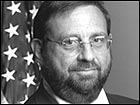|
Pitt outraged by Enron
|
 |
February 1, 2002: 4:13 p.m. ET
SEC chairman says he's dedicated to overhauling accounting system.
By Staff Writer Mark Gongloff
|
NEW YORK (CNN/Money) - Harvey Pitt, Chairman of the U.S. Securities & Exchange Commission, said Friday he is "outraged" by the unfolding Enron Corp. scandal and refuted accusations that his plan to reform oversight of the accounting industry doesn't have enough "teeth."
Earlier Friday, Pitt, who was attending the World Economic Forum's annual meeting in New York, had completed a workshop called "Responding to financial market volatility." In that conference, panelists decided that the best remedy for market volatility was transparency, both for money managers and companies.
"My belief is that our system is basically being implemented by companies that are honest and have integrity," Pitt said. "I do think, however, that there are problems in our system. The more I learn about Enron, the more outraged I become."
He could not comment on the investigation of Enron and its auditing firm, Arthur Andersen. The SEC and Congress are looking into financial irregularities by both firms that led to the energy trader's bankruptcy and to the loss of billions of dollars in stock value.
| |

|
|
| |
|
|
| |
The more I learn about Enron, the more outraged I become.
|
|
| |
|
|
| |

|
|
| |
|
|
| |
Harvey Pitt
SEC Chariman |
|
The best way to avoid such situations in the future, Pitt said, is to insure that companies provide better, more current information, increased corporate governance and that accounting principles be improved.
"The system needs repair. The failure to repair it meant that our chances of preventing Enron were reduced dramatically," Pitt said.
Pitt recently announced a plan to reform the way accounting firms are regulated, including an overhaul of the peer review system. His predecessor, Arthur Levitt, has criticized Pitt's proposal, saying it lacks "teeth," in part because it still includes peer review.
"I welcome any constructive criticism," Pitt said. "I think [Levitt's] criticism ... doesn't have any bearing or relationship to what we actually were proposing."
"We are proposing something that would have powers of compulsion, powers of enforcement, complete independence from the accounting profession," Pitt added. "My predecessor presided over a system in which there was no independent discipline involved."
He also responded to a recent critical article in the Wall Street Journal, saying someone had gone out of their way to mislead the paper.
The Journal last week reported that an SEC investigation into the accounting industry peer review process had "petered out" after Pitt became chairman. Pitt pointed out that, soon after he became in chair, in August 2001, he was forced to respond to the Sept. 11 attacks. In any event, he also has made an overhaul of the peer review process one of his top priorities, he said.
"I have been critical of the peer review system before Enron," he said. "I'm on the record and will remain on the record."
"I want to reaffirm that the investing public is entitled to the best system we can produce," Pitt added. "While our system is better than any other, it has dramatic flaws. We will not allow the SEC to abdicate its responsibility to solve these problems."
Pitt also responded to a Jan. 27 article in the New York Times that questioned the SEC's asking the National Association of Securities Dealers to drop a lawsuit against the Island ECN electronic trading system. According to the report, the NASD planned to sue Island for withholding the best price for its most heavily traded stock, the Nasdaq tracking stock, which trades under the symbol QQQ, a violation of SEC rules.
"There is a growing sense of unease among investors that the S.E.C., under its new chairman, Harvey L. Pitt, may not be the investor protector that the Enron era requires," the article said. "The view appears to be justified."
Pitt said the Times reporter, Gretchen Morgenson, had the facts wrong in the story and that the first he learned of the issue was when he read her article. He said the NASD was uncertain about whether or not Island was violating rules and had asked the SEC for protection if it didn't do anything about it. In the end, the issue never came before the SEC, Pitt said.
"It's an example, in my view, of somebody not checking out the relevant facts before they print a story," Pitt said. 
|
|
|
|
|
|

|

